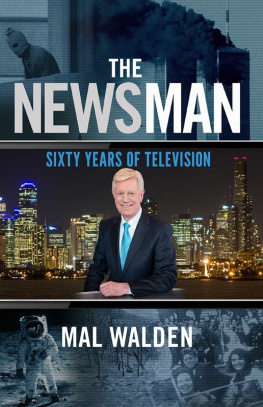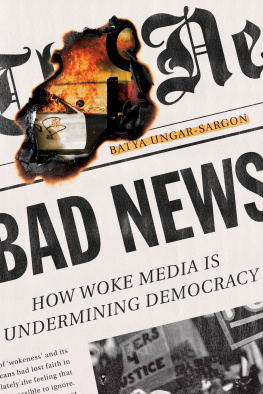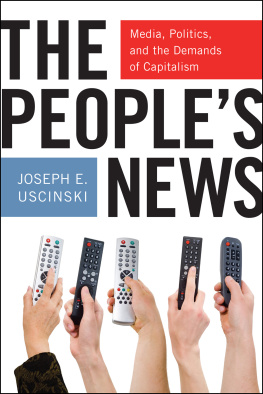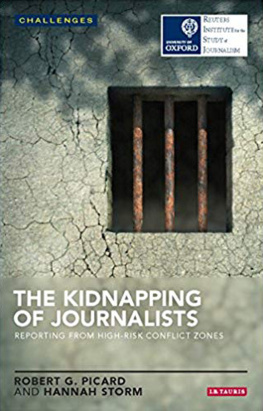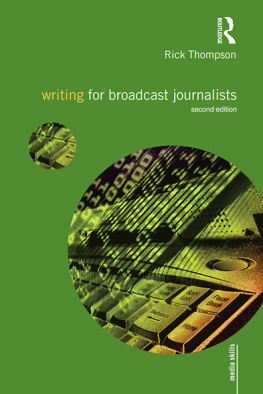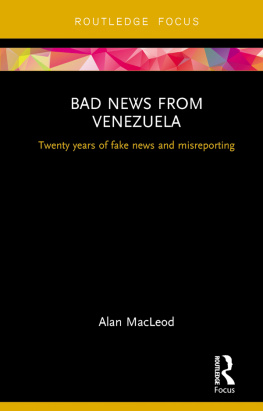

First published in the UK in 2018 by
Intellect, The Mill, Parnall Road, Fishponds, Bristol, BS16 3JG, UK
First published in the USA in 2018 by
Intellect, The University of Chicago Press, 1427 E. 60th Street,
Chicago, IL 60637, USA
Copyright 2018 Intellect Ltd
All rights reserved. No part of this publication may be reproduced, stored in a retrieval system, or transmitted, in any form or by any means, electronic, mechanical, photocopying, recording, or otherwise, without written permission.
A catalogue record for this book is available from the
British Library.
Cover designer: Holly Rose
Copy-editor: MPS Technologies
Production manager: Mareike Wehner
Typesetting: Contentra Technologies
Print ISBN: 978-1-78320-883-8
ePDF ISBN: 978-1-78320-885-2
ePUB ISBN: 978-1-78320-884-5
Printed and bound by Hobbs, UK
Inside the TV newsroom: Profession Under Pressure. A Newsroom Ethnography of Public Service TV Journalism in the UK and Denmark Copyright Line Hassall Thomsen, 2018.
This book is in part based on the Ph.D. thesis New Struggles, Old Ideals: The Everyday Struggle Towards Being a Good Journalist Inside Public Service TV Newsrooms in the UK and Denmark submitted for the degree of Doctor of Philosophy to the Department of Aesthetics and Communication at Aarhus University, Denmark.
Drawing in chapter 8.2 courtesy of graphic illustrator at TV Avisen, DR. All other photos and illustrations courtesy of the author
This is a peer reviewed publication.
Contents
Acknowledgements
I could not possibly name all the people who have helped make this book a reality. Here I attempt to acknowledge just some of the key people to whom I am indebted.
First, and most importantly, I am indebted to all the TV news workers who have shared so openly their everyday working lives with me. From 2007 until 2017, the openness and frankness with which they have shared their everyday work with me has meant everything to this project. Thanks to all the staff at BBC News, at ITV News, at DRs TV Avisen and at TV2 Nyhederne without whom this project would have been impossible. Also thanks to the management staff and News Editors of each of these four broadcasters who have granted access. Without the access and the openness with which I was met, this book could have never been. The whole idea of this study relies on years of working as a journalist inside both print and TV newsrooms in the UK. I am grateful to all the people who helped me get on and learn about news work during my time working as a journalist in Britain particularly the journalists at the Home and Arts Desk of The Independent, my fellow colleagues at ITV News Channel, the newsroom at ITV News, More 4 News and everyone at Channel 4 News.
In taking the step from the practice of journalism to the theories of it, numerous academics have been a great help and inspiration. Henrik Bdker has been an invaluable guide throughout the process of writing the Ph.D. which inspired this book. I am very grateful to Nils Bubandt for his sharp eyes on content reading. Unni From, Charlotte Wien and Karin Wahl-Jorgensen have given constructive comments on an early version of this book. Nigel Rapport, Georgina Born, Brian Winston and Robin Nelson have each commented on earlier drafts of several of the chapters. Thanks to Annette Markham, Inka Salovaara and Anja Bechmann for detailed comments and engaged discussions of parts of the book. I am grateful to so many other academic colleagues, both at the Department of Media and Journalism Studies at Aarhus University and at universities abroad.
I am much obliged to Jrgen Bang for enabling funding from the three sponsors: Update at the Danish School of Media and Journalism, the Department of Information and Media Studies at Aarhus University and the national doctoral school, Forskerskolen i Medier, Kommunikation og Journalistik. I am of course thankful to each of these sponsors. As I realised during the initial stages of application, funding a cross-disciplinary and inter-disciplinary project such as this, particularly with an applicant who has been out of academia for a few years, does not happen often. I am very grateful that my three sponsors had enough trust in the project to deviate from this norm.
This project was initially part of the project Dansk public service p journalistikkens betingelser: Udviklinger, dilemmaer, visioner, funded by the Danish Radio- og TV-Nvnet fund for research into Public Service Broadcasting. Being a part of this project, a collaboration between researchers from Aarhus University and the Danish School of Journalism, has been fruitful for the early stages of this book.
Thanks is also due to my aunt Anette and uncle Lars who let me stay with them during fieldwork at DR in Copenhagen, and to Lisbet and family for letting me stay with them in Odense during my fieldwork at TV2. It meant a great deal that I could feel so at home while being in the near vicinity of the newsrooms I studied.
The book in hand would have not existed without the enthusiasm, encouragement and sharp eyes of the excellent staff at Intellect Books. In particular, I would like to extend thanks to production editor Mareike Wehner.
Lastly, and crucially, I am indebted to my family. I am grateful to my mum Susanne Hjlund, for supervision and baby-sitting services, to my dad Kurt Thomsen for sailing and lobster-fishing when needed. Thanks to Emil, Marie, Sigurd, Ivan and to Sofie, Leo and Gala. Finally, I am grateful beyond words to my husband John, our son Viktor James and daughter Matilda Aila. Thanks for the music and for keeping alive the sense of wonder.
Line Hassall Thomsen
Prologue
Crossing the Gap
We need more bodies!, yells a Programme Editor.and make sure you cant make out their facesjust bodies! I dont want disfigured body parts, just bodies and body bags! I stay on target, working alongside my colleagues. We all look stern, staring into the screen. We have been covering the tsunami for almost a week now. Today, video feeds of corpses are coming in. The bodies have been laying in tropical climate waiting to be identified. By now I should be used to the sight. But tears are welling up. I cut the last images for the next news bulletin, which goes on in a few minutes, then I hurry to the bathroom. You do not cry in the newsroom.
To my surprise, hiding inside the toilet cubicles I find both a reporter and a producer with mascara running down their cheeks. We laugh. Then we cry and talk about the tragic pictures. Dry our eyes and walk hurriedly, professionally, into the newsroom. And we keep on working, without mentioning our emotions.
January 2005, inside the ITV Newsroom, Kings Cross, London
The morning meeting has just begun and we are discussing the stories to run today. There is an excited mood in the newsroom. Journalists, Programme Editors and producers are all sat in a semi-circle, relaxed, leaning back on their chairs, coffee in hand. Some reporters share a joke about yesterdays news programme. Our News Editor has had a cake designed with the Olympic rings on it, and it has just arrived for us to enjoy during the meeting. Yesterday, London was chosen to be the host city for the Olympic Games in 2012. Today we are celebrating.


